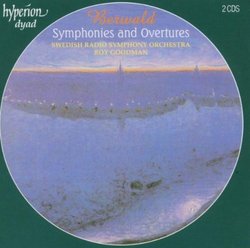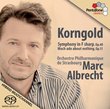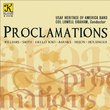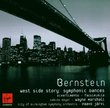| All Artists: Franz Berwald, Roy Goodman, Swedish Radio Symphony Orchestra Title: Berwald: Symphonies and Overtures Members Wishing: 0 Total Copies: 0 Label: Hyperion UK Release Date: 6/8/2004 Album Type: Import Genre: Classical Styles: Opera & Classical Vocal, Forms & Genres, Theatrical, Incidental & Program Music, Historical Periods, Romantic (c.1820-1910), Symphonies Number of Discs: 2 SwapaCD Credits: 2 UPCs: 034571120430, 034571120430 |
Search - Franz Berwald, Roy Goodman, Swedish Radio Symphony Orchestra :: Berwald: Symphonies and Overtures
 | Franz Berwald, Roy Goodman, Swedish Radio Symphony Orchestra Berwald: Symphonies and Overtures Genre: Classical |
Larger Image |
CD DetailsSimilar CDs |
CD ReviewsSpectacular anonymous | Los Angeles | 11/23/2005 (5 out of 5 stars) "Franz Berwald was one of those amazing people who crammed enough into his life for any 5 more energetic types. The man was a highly-trained and enormously gifted musician who founded an orthopedic clinic while he was pursuing his musical career in Berlin. He developed physical rehab techniques still in use today. He was a fiery advocate of progressive social causes at a time when that kind of thing was seen as treasonous by more than a few more solid citizens...and, Berwald was a monster talent as a composer. There's nothing easy about writing genuinely original music at any time. But Berwald lived the same time as Schubert, Beethoven, Mendelssohn and Schumann. Yet, he managed to write completely original music. His symphonies are miracles of originality, concision, melodic beauty, structural sophistication and sly wit. The fact that they are so neglected by conductors and orchestras is nothing short of scandalous. Berwald's work should be right up there with Schumann and Mendelssohn. At the very least. You could make a case that his symphonies, at their best, surpass Schumann for originality, and exceed Mendelssohn in their generosity of spirit. The symphonies are not only beautifully made throughout, they're full of magical moments that you'll have to hear more than once, right on the spot. They're full of those "wait-a-second-that-was-gorgeous-I-have-to-hear-that-again" moments. Just as one example, the quiet end of the first movement of Symphony #4 is an utter stroke of genius. I probably listened to it a half-dozen times the first time I heard the piece. This recording of Berwald's symphonies is definitive. The technical quality is ideal. Nice ambiance, but nothing is lost in the wash. All the power and delicacy of the music and the playing is preserved. Tony Faulkner engineered, and the man has never made an ordinary recording in his life. The orchestra plays with wonderful precision and panache, and Roy Goodman clearly gets this music in every detail. In short, this is another spectacular accomplishment from Hyperion, and you should buy it right now, before it goes out of print. Franz Berwald was among the greatest geniuses music has ever produced, and this recording proves it, beyond any shadow of a doubt. You'll love it." The Place to Turn for the Berwald Symphonies M. C. Passarella | Lawrenceville, GA | 07/01/2009 (5 out of 5 stars) "I have never heard Roy Goodman give a second-rate performance on disc (would I could hear him in the flesh sometime!) and believe that in the repertoire he specializes in, which happens to include Berwald and other early Romantics as well as Haydn, he is always very fine indeed. I have his Schumann Symphonies with the Hanover Band, which I find revelatory and just about as fine as Gardiner's far more famous set, and his Rossini overtures are some of the most edge-of-the-seat versions ever committed to disc. I recommend as well that you sample his incomplete Haydn series for Hyperion, which offers some gems.
Berwald requires more subtlety than Rossini and here gets luminous, nuanced performances from Goodman and the Swedish Radio Symphony, which seems to be just the right size of orchestra for Berwald's special sound world. After a wonderful first movement reminiscent of sunrise or some other natural process of regeneration, the great Symphonie Singuliere's last movement bolts along like an out of control steam engine. The First Symphony has just the right elements of austerity and daring (listen to the fascinating independent writing for trombones in the last movement), and the other symphonies retain their special and rather different characters as well. And this is a generous and sensible coupling, including as it does Berwald's virtually unknown Symphony in A fragment, a very substantial first movement that goes on and on in Schubertian fashion but nonetheless speaks to a unique talent with a wealth of ideas to lavish on sonata form. It's fairly unsmiling compared to the outright grins that break out in much of Berwald's capricious symphonic writing, as well as relatively undisciplined, and helps us gauge the great strides the composer took in the 1840s as he joined the ranks of successful early Romantic symphonists such as Schumann, Mendelssohn, and Gade. Along with the A-major fragment are Estrella di Soria, a powerful minor-key opera overture, and the more characteristically smiling Queen of Golconda, with its lovely cello melody at the beginning, shades of William Tell. Again, the performances are first-rate, and the recording provided by legendary sound man Tony Faulkner is wonderfully detailed yet placed in a most realistic ambience: nigh perfect. At Hyperion's two-fer price, this seems to me the place to turn for the Berwald Symphonies. " |





